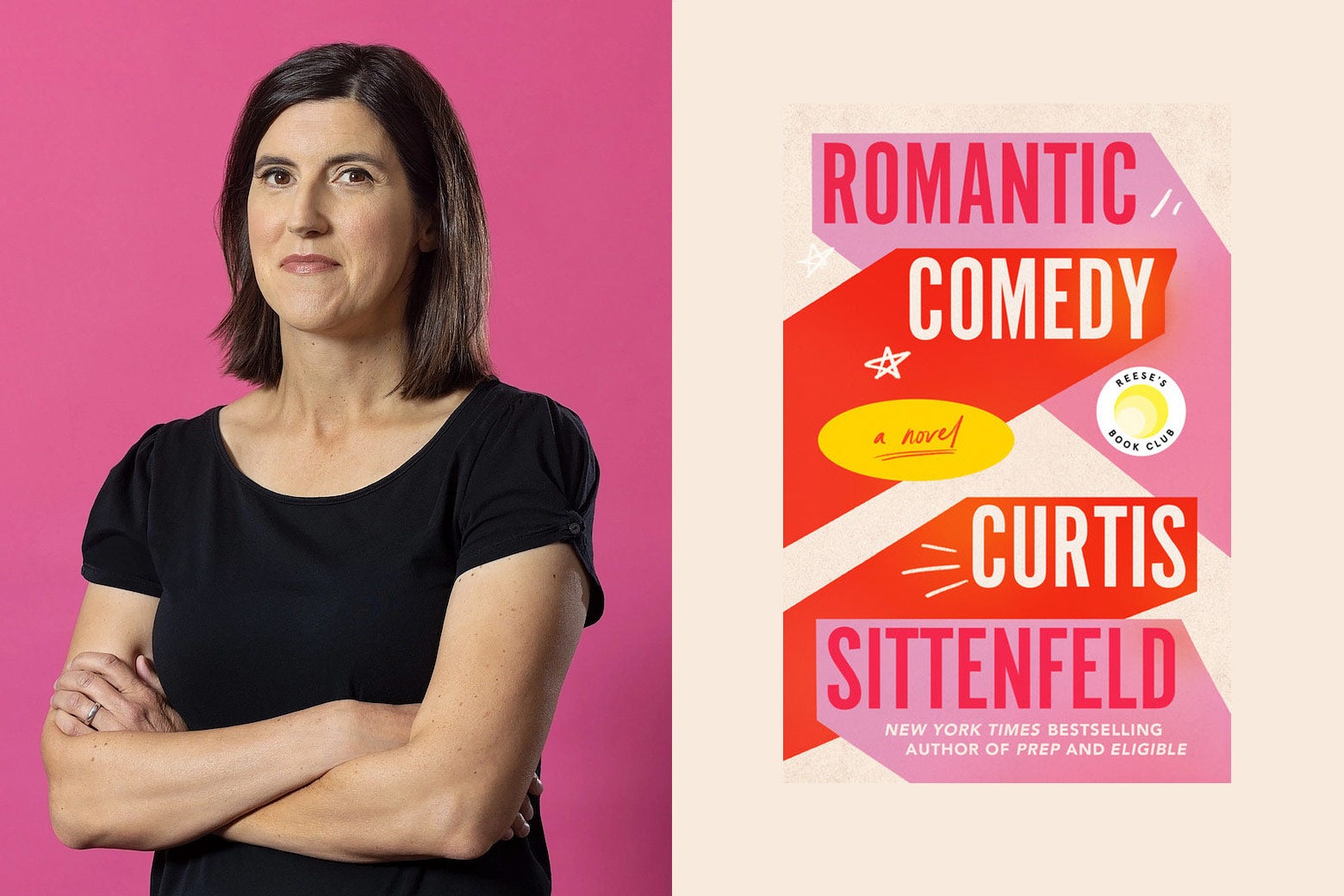What’s So Wrong With Cheesy Romance?
Author Curtis Sittenfeld wrote a cynical woman as a romantic comedy heroine that won’t make you gag in Romantic Comedy.

Gabfest Reads is a monthly series from the hosts of Slate’s Political Gabfest podcast. Recently, Emily Bazelon spoke with author Curtis Sittenfeld about how to make a non-cheesy romance novel in her new book Romantic Comedy.
This partial transcript has been edited and condensed for clarity.
Emily Bazelon: I kept thinking of a lemon meringue pie when I was reading this book. It just had this light, snackable, delicious quality to it in which you’re exploring some serious themes, but you’re doing it with a sense of humor and a kind of light touch throughout. It was really fun to read. One of the questions in the book that’s somewhat more serious, and I think really interesting is the line between cheese—like cheesiness—and deep romance, sincere emotion. There’s nothing like pop music for making us all think about this line. You have this passage in the book where Noah asks Sally to define cheese for him and he says, “Because I still haven’t figured it out after two decades, where the line is between cheese and emotional extravagance that’s acceptable.” I just wonder what you were thinking about there, whether there were examples in your head, whether Noah is supposed to represent cheese or something deeper.
Curtis Sittenfeld: I think that cheese is in the eye of the beholder, truly. My first novel came out 18 years ago, and the one lesson that I’ve learned over and over is that this is all so subjective. Someone could say “this is cheesy, this is boring.” Or someone could say, “this is a delicious lemon meringue pie.” It’s like neither person is really right. I think that’s true with cheese. Absolutely without question, I enjoy – I might lose all credibility saying this – I enjoy listening to Ed Sheeran songs when they come on the radio. My children, sometimes politely and sometimes rudely, are basically like, “Change the station.” He’s a good example because I think he’s both, I think he’s cheesy and moving depending on the song or sometimes within the same song, but nobody can define it. Anyone who tells you they can is lying.
I like that answer. One of the other more kind of potent themes in the book is about careerism, what it means to be really devoted to what you do. Sally kind of wrestles with how committed she is to writing sketch comedy, but on the other hand, she truly is committed. Essentially her marriage broke up so that she could go to New York after she gets this offer to write for The Night Owls/Saturday Night Live. There’s a point in the book in which it’s an early moment of connection between Sally and Noah, long before they actually get together. This idea that she says that the show she works on is the love of her life. Do you feel that way about your work? Were you trying to explore here the idea that women can feel this way and that’s okay, that can even be a good thing?
I definitely think women can feel that way and it can be a good thing. I think anyone can feel that way and it can be a good thing. I certainly feel like there are many ways to make a life, and even though this book has a sort of conventional structure, I don’t think Sally herself is particularly aspiring to marriage. I don’t think the book is holding up marriage is the ultimate goal. Maybe in my twenties I did think probably that if you never got married, it was sad or something. I’m 47 and I totally don’t feel that way at all. I think the world is becoming simultaneously more narrow-minded and more open-minded. If you live with your best friend forever or if you live with your parakeet forever, to have the life you want is great.
It doesn’t seem though that Sally is quite having the life she wants when she is writing for The Night Owls and in this kind of having sex but dateless period of her existence, she seems sort of cut off in some way, although I loved her friendships with a couple of the women comedians on the show. Are you portraying her in some ways as incomplete until romance hits her and did you have any mixed feelings about that or am I over reading that portrayal?
I don’t see her as incomplete. Just to be clear, the marriage that doesn’t last for her is an early marriage in her 20s.
Starter marriage, classic starter marriage.
Yes, a starter marriage. She’s in her late 30s when the book opens. I think that I don’t think she sees her life as incomplete. I think she feels almost like she’s taken control of her life and kind of said “this thing that I wanted is a version of love that is not available to me. I’ve kind of taken these other things in my wildest dreams. Would I prefer something else? Yes, but I don’t think my wildest dreams are available.” Then maybe they are, but I actually think that’s a more widespread question that’s sort of like: what is being realistic and what is being greedy? I think that can apply to family, it can apply to jobs, it can apply to love and romance.
Even somebody who has an okay marriage and then maybe thinks I want a spectacular marriage maybe with someone else or something. If you have an okay job, are you supposed to be grateful or are you supposed to aspire more? I think absolutely these are questions in the book. I don’t think they’re really answered because I don’t think they’re answerable. I think the book’s kind of exploring them but not resolving them.
